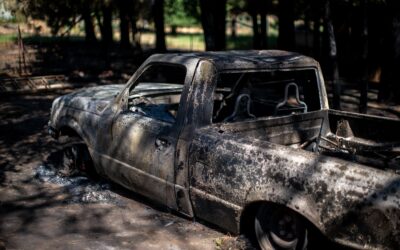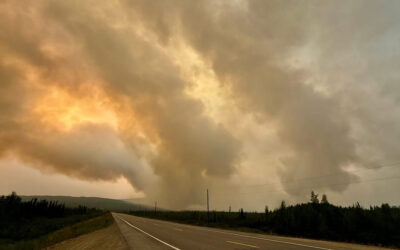Joergensen was arrested for allegedly starting the Spring Creek Fire in 2018

By COLLEEN SLEVIN Associated Press
DENVER (AP) — A judge on Friday decided against dropping criminal charges lodged against a mentally ill Danish man accused of starting a large Colorado wildfire that burned 149 homes in 2018.
The decision came after a prosecutor said Jesper Joergensen would not be deported if released from jail because of Biden administration changes to immigration policy.
Fearing that Joergensen could pose a danger if freed, Judge Gregory Lyman instead ordered him sent to the state mental health hospital for evaluation and whether a doctor there might recommend Joergensen be forcibly medicated to treat his delusional disorder.
Lyman acknowledged he was not sure if he had the authority to send Joergensen to the Colorado Mental Health Institute in Pueblo, which has struggled for years to keep up with demand for the evaluations of people accused of crimes.
Earlier this month, Lyman seemed to be leaning toward dismissing the case after Joergensen’s psychiatrist in a mental health jail unit indicated he did not think that Joergensen would qualify for forced medication since he does not pose a risk to himself or others while behind bars.
If Joergensen is sent to the state hospital, a doctor there could possibly reach a different conclusion and ask the court for permission to forcibly medicate him.
Aaron Pratt of the state Attorney General’s Office told Lyman that Colorado’s Office of Behavioral Health had the right to decide where people get mental health treatment.
He also noted there were “practical concerns” in getting people admitted to the Pueblo hospital, which recently resumed taking in new patients following a pause because of the COVID-19 pandemic.
During the presidency of Donald Trump, anyone in the U.S. illegally was a priority for deportation. After Joergensen was arrested for allegedly starting the Spring Creek Fire in 2018, immigration officials said he had overstayed his visa and asked to be notified of his release from jail so that they could take him into custody.
But on the first day of Joe Biden’s presidency, the Department of Homeland Security directed immigration authorities to focus on national security and public safety threats as well as anyone apprehended entering the U.S. illegally after Nov. 1 and put a 100-day pause on most deportations.
While representatives of Immigration and Customs Enforcement did not respond to questions about how the policies would affect Joergensen, a Homeland Security memo laying out the new directives says only those convicted of aggravated felonies would be considered a public safety threat requiring deportation.
According to a prosecution motion filed Thursday, the U.S. Immigration and Customs Enforcement field director for Colorado, Kostas Patakonstantinou, told Assistant District Attorney Cynthia Kowert that Joergensen would not be deported under the new policies.
Joergensen is charged with 349 counts of arson and has been held in jail for more than two and a half years.
Several experts have found that he is unable to participate in a trial and help his defense lawyers because of detachment from reality.
Doctors have said Joergensen could possibly become well enough to be tried if he took medication but that he has refused. Joergensen’s defense lawyers have argued he will not take medication because his delusions cause him to believe he is well.
Joergensen’s jail psychiatrist, Dr. Jonathan Thiele, has said medication would have a “50-50” chance of working within two to six months but that Joergensen’s symptoms could return if he is returned to jail and again refuses to take medication.
According to court documents, Joergensen told police he had started a fire on June 27, 2018, to burn trash on land where he was living in a camper despite a ban on open fires because of the dry conditions but later said he had been grilling in a permanent fire pit.
He said he woke up from a nap, saw a fire burning in sage brush and burned himself as he tried to put it out.
The wildfire burned more than 156 square miles (404 square kilometers) east of Fort Garland, about 205 miles (330 kilometers) south of Denver.
All contents © copyright 2021 The Associated Press. All rights reserved.




